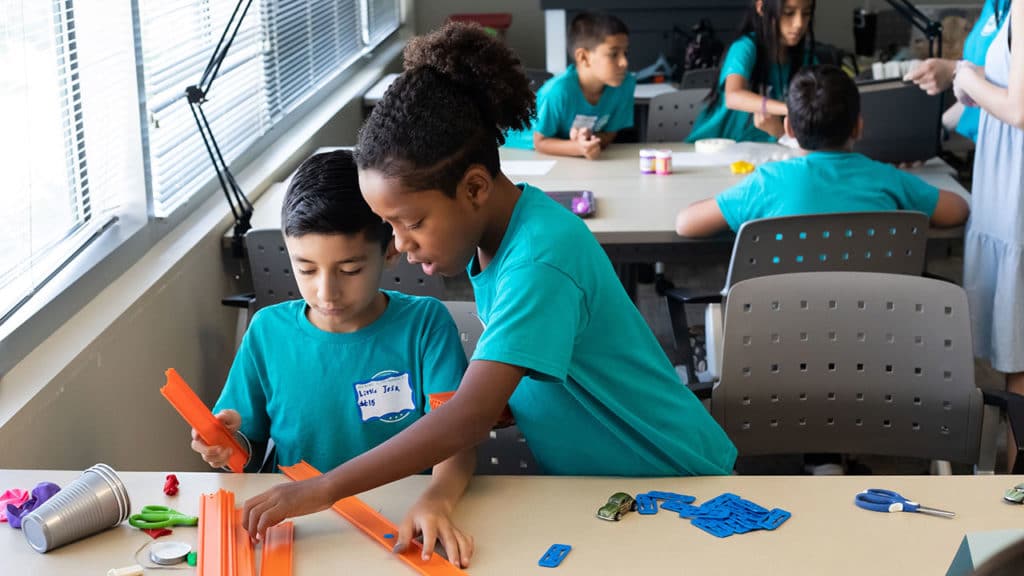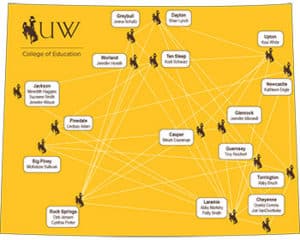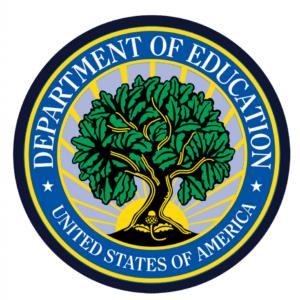11 Jul2022
By Kaitlyn Brennan
This weekly Washington Update is intended to keep members informed on Capitol Hill activities impacting the educator preparation community. The views expressed in this post do not necessarily reflect the views of AACTE.
While I typically break from Washington Update during Congressional recess, I am excited to share that last week, the House Appropriations Committee approved the fiscal year (FY) 2023 Labor, Health and Human Services, Education, and Related Agencies bill on a 32 to 24 vote.
The bill provides $242.1 billion, an increase of $28.5 billion or 13% above 2022 funding levels. While significant advocacy work to get this across the finish line remains- the Appropriations Committee’s approval marks a great step in securing historic increases for education funding at the federal level. Your voices are being heard!
11 Jul2022
By Denise Ray

The University of North Georgia’s (UNG) Summer Scholars STEM Institute held throughout the month of June helped pre-service teachers in UNG’s College of Education gain experience in preparing lesson plans in science and engineering while focusing on English language learners. A nearly $300,000 National Science Foundation grant, which runs through 2024, helped fund the academy for 60 students rising into fourth grade through eighth grade at local area schools.
07 Jul2022
By Jason Harper
 The University of Wyoming has welcomed the inaugural cohort of the Wyoming Teacher-Mentor Corps (WTMC), an initiative led by the UW College of Education.
The University of Wyoming has welcomed the inaugural cohort of the Wyoming Teacher-Mentor Corps (WTMC), an initiative led by the UW College of Education.
The WTMC is designed to foster teacher excellence by creating a network of Wyoming educators who can provide expert support for emerging teachers. The 21 cohort members represent 16 of the state’s 48 school districts — creating a web of expert teacher mentors that spans Wyoming.
07 Jul2022
By Lucas Held and Lauren Pescatore
As state leaders continue to weigh the best use of federal funding to improve education in the wake of the COVID-19 pandemic, a major new research report by the Learning Policy Institute and The Wallace Foundation underscores the importance of federal, state, and district policies that foster the availability and quality of principal preparation and professional development programs. The research finds that the preparation and professional development a school principal receives not only shapes their efficacy as a leader, but are also associated with positive outcomes for teachers and students.
05 Jul2022
By Angela Turk
Georgia State University’s College of Education & Human Development received a $106,928 grant from the Georgia Department of Education to help teachers earn their dyslexia endorsement.
Georgia State is one of 14 universities and regional education service agencies to receive state funding, which can be used to cover tuition, fees and exam costs for teachers in dyslexia endorsement programs or to improve and expand those programs, according to the Department of Education’s website.
05 Jul2022
$1.2 Million Grant from National Science Foundation Funds Alternative Certification Program
By Sara Strong

Photo credit: Getty
Some people are born to be teachers, even if early career choices lead them down other paths first. For professionals working in STEM fields, a new University of Houston program offers a fast track to earn a place at the head of a secondary school STEM classroom – and change their own lives in the process.
Applications are currently being accepted for the first cohort of STEMPro, an intensive nine-month alternative teaching certification program and a collaboration between UH’s College of Natural Sciences and Mathematics and College of Education. The addition of this post-baccalaureate outreach, which focuses on already established professionals, expands the existing teachHOUSTON program, which serves undergraduates seeking teaching certificates. It also supports the UH focus on training quality teachers ready to serve in communities where they are needed most.
05 Jul2022
By Lori Goodson
The Rural Education Center in the Kansas State University College of Education has entered a strategic partnership with the Rural Schools Collaborative to strengthen and advance every aspect of rural education in Kansas. The Rural Schools Collaborative, housed at Monmouth College, is a national grassroots network of rural schools, higher-education institutions and organizations focused on rural teachers and rural education.
28 Jun2022
By Gisele Galoustian

Florida Atlantic University’s College of Education School Leaders Program has been awarded a three-year, $1,039,041 grant from Broward County Public Schools (BCPS) to support two graduate degree programs as part of the Teacher School Leader Equity for Instructional Performance (EQUIP) grant project initiative. BCPS is the sixth largest public school system in the United States and the second largest in Florida.
28 Jun2022
By Kaitlyn Brennan
This weekly Washington Update is intended to keep members informed on Capitol Hill activities impacting the educator preparation community. The views expressed in this post do not necessarily reflect the views of AACTE.
All eyes were on Washington Friday morning as news broke that the Supreme Court has officially overturned Roe. V. Wade. American Federation of Teachers President Randi Weingarten issued a statement:
21 Jun2022
By Kaitlyn Brennan
 This weekly Washington Update is intended to keep members informed on Capitol Hill activities impacting the educator preparation community. The views expressed in this post do not necessarily reflect the views of AACTE.
This weekly Washington Update is intended to keep members informed on Capitol Hill activities impacting the educator preparation community. The views expressed in this post do not necessarily reflect the views of AACTE.
This week, the House Appropriations Committee has been busy marking up the first 6 of 12 government funding bills for FY2023. The process is expected to be almost, if not completely, partisan. In the upper chamber, the Senate Appropriations has not reached an agreement on how much to spend on defending and non-defense discretionary funding, ultimately delaying forward movement.
21 Jun2022
JMU College of Education program will empower first-generation college and at-risk local students to unlock potential
By Clay Sutton
James Madison University’s College of Education will receive $1.4 million over the next five years to help eligible high school students in the Shenandoah Valley overcome social, emotional, and academic barriers to achieve success in education beyond high school.
JMU will receive a total of $1,437,685 to create a JMU Upward Bound Program. The funds will support two programs, one at Harrisonburg High School in Harrisonburg City Public Schools and one at Spotswood High School in Rockingham County Public Schools, supporting a total of approximately 30-35 high school students at each school.
17 Jun2022
By Michael Rose

A bipartisan group of senators has reintroduced the Civics Secures Democracy Act of 2021, which would authorize a historic investment to support K–12 civic education and American history.
Over the last several decades, civics education in American schools has seen a significant decline. Given the divisiveness in our politics and the lack of knowledge and understanding of democratic principles, norms, and institutions, a robust investment in civics education is needed.
17 Jun2022
By Allison Matthews

(Photo by Grace Cockrell)
A group of young people with Autism Spectrum Disorder who are interested in science, technology and related fields are getting a new chance to learn about physics and other topics as part of an innovative camp at Mississippi State, which may be the country’s first of its kind.
MSU Assistant Professor of Physics Ben Crider is using a prestigious $600,000 National Science Foundation 2019 Career Grant to advance his nuclear physics research, which includes a highly interactive summer experience for students with autism that was delayed due to COVID-19.
17 Jun2022
$2 Million Will Be Dispersed to Educator Preparation Programs Over the Next Two Years
By David Bednarz and Eric Scoville

Governor Ned Lamont and Connecticut Education Commissioner Charlene Russell-Tucker today announced new investments to defray certification-related testing costs for aspiring educators in Connecticut.
A total of $2 million dollars of federal, state-level reserve American Rescue Plan Act, Elementary and Secondary School Emergency Relief (ARP-ESSER) funding is being dedicated over a two-year period, which includes $750,000 in year one and $750,000 in year two. The remaining $500,000 is being set aside for educators of color and other educators who will be completing their student teaching in urban school districts.
07 Jun2022
By Kyle Mittan

Chris Richards/University of Arizona
A University of Arizona College of Education program that provides mentorship and educational resources to Arizona’s Indigenous communities will extend its reach thanks to a $1.2 million grant from the Arizona Department of Education.
The Native Student Outreach, Access and Resiliency program, better known as Native SOAR, emphasizes Indigenous teaching and knowledge. Over the course of 10 weeks, the program allows UArizona students from any major to spend about three to four hours a week mentoring middle and high students across Arizona and teaching them about attending college, cultural resiliency, leadership skills and identity exploration.















